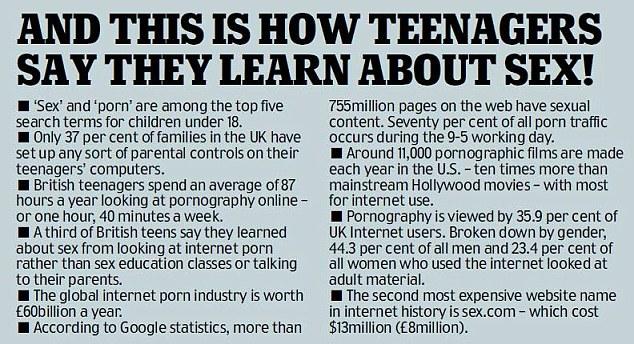By Chris Greenwood
Daily Mail
October 31, 2011
http://www.dailymail.co.uk/news/article-2055452/Internet-porn-Church-England-threatening-withdraw-millions-invested-ISPs.html?ito=feeds-newsxml
 |
| Vile: Campaigners claim the seemingly unstoppable flood of hard-core and violent pornography is corroding the very fabric of society (File picture) |
 |
| Easy access: Internet watchdogs say they have received thousands of complaints from computer users, including 2,700 in the last year alone (Posed by model) |
 |
 |
| Campaigner: MP Martin Salter helped introduce the new laws, but now says they need to be tightened |
 |
The Church of England is threatening to use its financial power to stem the tide of internet pornography.
It is considering withdrawing the millions it has invested in Internet Service Providers (ISPs) unless they take action.
Concern over the easy availability of vile images which demean women and corrupt the young has intensified following the disclosure that Jo Yeates's killer Vincent Tabak was obsessed with websites showing sexual violence, bondage and strangulation.
Police are under pressure to treat the worst pornography in the same way as child abuse images which are investigated by dedicated teams with substantial resources.
And ISPs such as Virgin Media, BT Broadband, AOL and Sky are under fire for failing to protect vulnerable children from being confronted by shocking images available at the click of a mouse.
The Church of England, which wields significant financial clout on the markets, is reviewing investments worth tens of millions.
It refuses to invest in firms which fuel the very problems Christians are trying to tackle and has already leaned heavily on supermarkets to be more responsible in the way they sell alcohol.
A Church spokesman said members of its ethical investment advisory group are considering new guidelines on pornography which take into account how easy it is to access with modern media. Campaigners claim the seemingly unstoppable flood of hard-core and violent pornography is corroding the very fabric of society.
They criticised the apparent failure of laws introduced in 2009 to outlaw images of rape, torture and extreme sexual violence as well as bestiality and necrophilia.
Anyone caught visiting such websites to view 'violent and extreme' pornography was threatened with up to five years in jail and an unlimited fine.
But officials admitted they expected to see only a small number of prosecutions and no extra funding was made available for a proactive police response.
The policy is in stark contrast to inquiries into the use of child-abuse images which are the responsibility of specially trained teams.
Liz Longhurst, who led the fight for a new law, said she was disappointed that there have been few prosecutions and attacked the recklessness of internet companies.
Her daughter, Jane, 31, was murdered in 2003 by Graham Coutts who, like Tabak, was obsessed with violent strangulation pornography.
She said: 'The internet service providers have so much to answer for. They go on about freedom, but for goodness sake where was Jane's freedom?
'The police should make it routine that if somebody is accused of murder or a serious attack they should investigate if this stuff is on their computer.'
Tabak was found guilty of murder on Friday although the jury was not told that he had trawled an internet site boasting 58,000 videos and 50 categories of pornography hours before strangling Jo.
The murderer viewed images of women being held by the neck saying 'choke me' and two naked women bound and gagged in the boot of a car.
The case has rekindled fears that the authorities and internet companies are failing to do enough to protect society from extreme pornography. One web watchdog admitted that orders aimed at forcing internet companies to remove material have been issued just 49 times in the past three years.
The Internet Watch Foundation (IWF) said this was despite thousands of complaints from computer users, including 2,700 in the last year alone.
IWF chief executive Susie Hargreaves admitted the watchdog has been largely powerless to act against the tide of extreme pornography.
She said: 'The IWF is able to act on any public reports of online obscene adult content where it is hosted in the UK and contravenes UK Law.
'However, we receive very few reports of this type of content which satisfies these criteria.'
The vast majority of obscene material reported to the IWF is hosted overseas or is assessed as unlikely to result in a prosecution.
Last year more than 2,700 reports were made by the public but just a dozen were judged as potentially criminal and eight notices issued.
Experts warn that the overwhelming amount of violent imagery on the internet can desensitise some men to believe that the abuse of woman is normal.
And there is little to stop children accessing and exchanging shocking images and videos on mobile phones and through social networking sites.
Recent figures revealed that more than a tenth of children under ten have accessed inappropriate adult material online.
The Church of England's stance on porn was welcomed by the Rev Richard Moy, who works with young people in Lichfield, Staffordshire.
He said: 'It is not surprising that people go from soft porn to progressively more hard-core porn to the point where they are so depraved that they do things that they would never imagine doing.
'I think that if people start using mild porn to gratify a need rather than looking at why they need that gratification then they will eventually move on to more disturbing things.'
Former Labour MP Martin Salter, who campaigned for the new laws, said he wants to see police using them and sending out a clear message.
'There are some people so evil and so depraved that nothing will deter them. But it was hoped that by tightening these laws we might prevent some unbalanced individuals from being tipped over the edge.
'Quite frankly, every time the police use these powers and there is more publicity about their existence, the greater the deterrent factor in these cases.'
Any original material on these pages is copyright © BishopAccountability.org 2004. Reproduce freely with attribution.